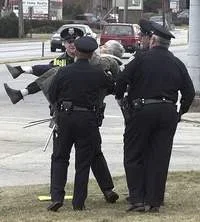Sorry, but please read what I wrote. I separated, "political," liberalism from, "humanist," liberalism. The first is a particular political party--English in origin I believe, which didn't come around until what...the late nineteenth century?
The latter sense applies rather nicely to Franklin and Jefferson, who certainly seem to me to have worked out of the sort of "broad-mindedness," that I'd associate with liberalism.
As for being a liberal, for the nineteen-thousandth time, I am not politically speaking a liberal: for example, I though Walter Mondale and Hubert Horatio Humphrey were both schmucks.
You're working, I'm afraid, out of a gimcrack definition of liberalism. Nor do I think that you really want to ride that, "state's rights," train very far, considering that its historical stops included the Confederacy, Jim Crow laws, and segregationism in all its forms.
Yes, liberals such as Daniel Bell tend to shift towards the, "big government," side of the spectrum. That's because a) local gov't, historically speaking, has a very poor record with some laws--like civil rights legislation and EPA regs that we have to have, b) corporations (as the last two years should pretty well illustrate, and does anybody in faavor of letting the market police itself have family in Bhopal, India?), c) regrettably, the world's gotten pretty big and complex. Are they always right? Absolutely not. But make no mistake, most of the folks who are yelling about the EPA are shilling for corporations. Look at states like West Virginia, treated so very well by coal companies and local politicians...
As I've mentioned before, there's a pretty nice, "pox on both their houses," argument in the first couple chapters of Cornell West's "Race Matters." West is pretty smart aand pretty lucid about the sterility of arguing liberal vs. conservative, even if he was dumb enough to play Councellor West in the last two really, really crappy, "Matrix," movies...

